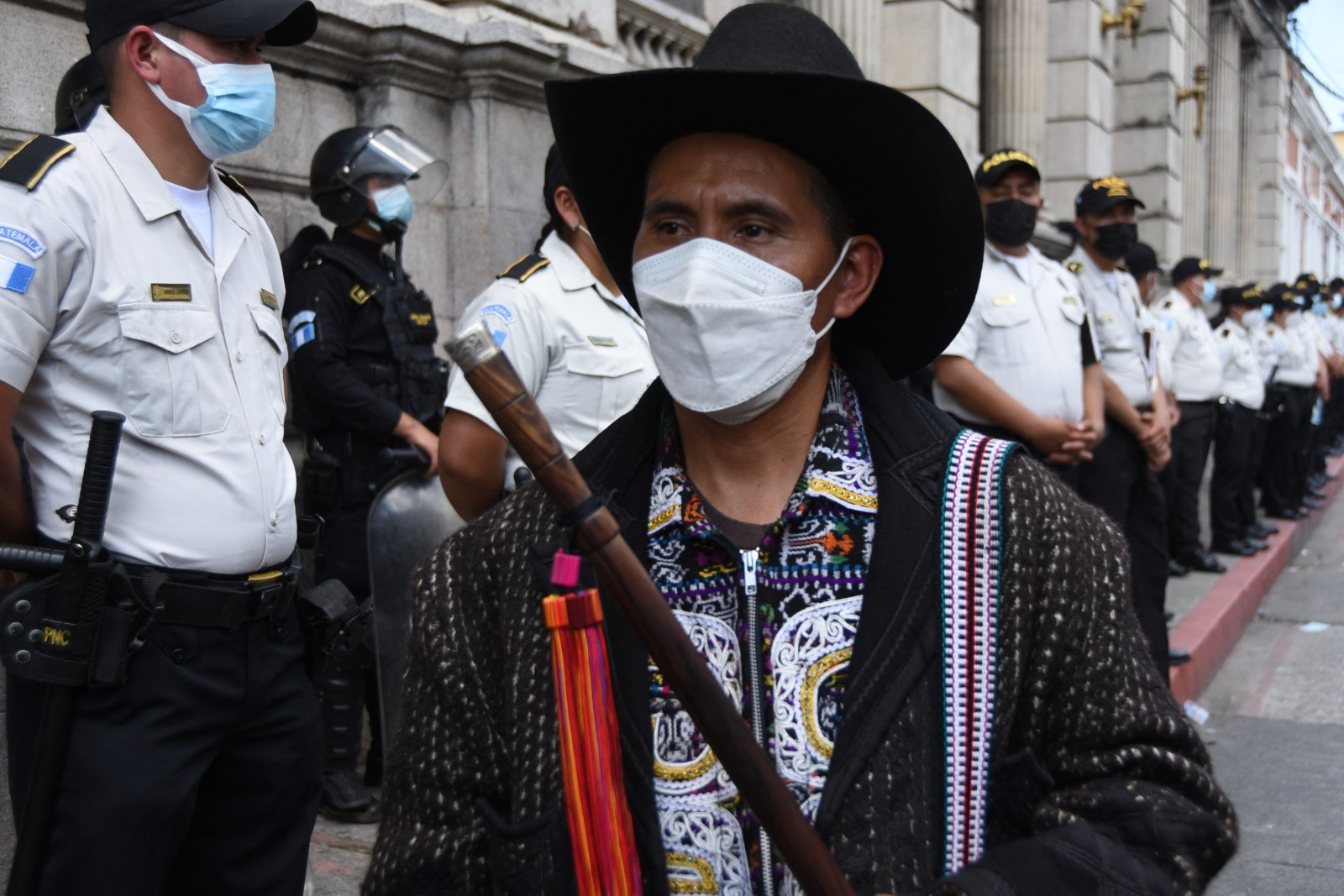Share post now

global
The Alliance Sud magazine analyses and comments on Switzerland's foreign and development policies. "global" is published four times a year (in german and french) and can be subscribed to free of charge.
Article, Global
06.12.2021,
The right to a safe, clean, healthy and sustainable environment has been enshrined as a fundamental right in a resolution adopted by the Human Rights Council. Enterprises too fall within its scope.

The latest violent clashes between the police and indigenous communities in Guatemala over a nickel mining project of the subsidiary of the Zug-based Solway Investment Group leave no doubt that environmental degradation is often central to the topic of corporate accountability.
© Orlando ESTRADA / AFP
For the first time on 8 October 2021, the United Nations Human Rights Council of the (UNHRC) recognised the right to a "safe, clean, healthy and sustainable environment" as a fundamental human right. Despite criticism in the run-up to the session of the Human Rights Council, mainly from the USA and the United Kingdom, the Council adopted the new Resolution with 43 votes. It had been sponsored by Costa Rica, the Maldives, Morocco, Slovenia and Switzerland. Russia, India, China and Japan abstained. The resolution calls on States to take steps to implement the right to a safe, clean, healthy and sustainable environment, with special reference to the biodiversity and ecosystems. Should the UN General Assembly adopt this resolution, it would be the first of its kind since the 1948 adoption of the Universal Declaration of Human Rights. The right to a clean environment was first mentioned in the Stockholm Declaration of 1972.
The way for this resolution was paved by a campaign involving 13,000 civil society and indigenous peoples' organisations, 90,000 children, private sector stakeholders and the Global Alliance of National Human Rights Institutions. According to David Boyd, UN Special Rapporteur on Human Rights and the Environment, it took literally millions of people and years of work for this resolution to materialise. For her part, Michelle Bachelet, UN High Commissioner for Human Rights, has said that the recognition of the human right to a clean, healthy and sustainable environment is about protecting people and the planet, "the air we breathe, the water we drink, the food we eat". According to the High Commissioner, this resolution clearly recognises environmental degradation and climate change as interconnected human rights crises. During the vote, which came just a few weeks ahead of the Climate Summit (COP26) in Glasgow, it was also decided to establish a Special Rapporteur dedicated specifically to the human rights implications of climate change.
The new resolution gives central importance to the "right to life, liberty and security" of environmental human rights defenders and reaffirms that under the UN Guiding Principles on Business and Human Rights, all businesses are responsible for safeguarding both human rights and human rights defenders, also in the specific realm of the environment. Environmental activists around the world are subject to constant physical attacks, legal proceedings, imprisonment, arrests and smear campaigns. Some 200 environmental activists were murdered in 2020 alone.
In many jurisdictions, environmental due diligence is mandatory for enterprises under the law. In France, the law on due diligence ("loi relative au devoir de vigilance") requires certain large companies to implement a due diligence plan for the detection and avoidance of risks caused by companies, their subsidiaries, subcontractors or suppliers – relating to human rights, personal health and safety and the environment. Under French law, violation of these regulations constitutes an infraction, for which the company is held liable under civil law and liable to pay damages.
The new German law (Supply Chain Act) also encompasses environmental protection in cases where environmental risks may lead to human rights violations. Among other things, the law provides for a ban on soil degradation, water pollution, air pollution, noise emissions and excessive water consumption. Environmental obligations are laid down on the basis of two international agreements on the avoidance of health and environmental risks.
In its parliamentary initiative on corporate due diligence and corporate accountability, which recommends that the Commission prepare a draft directive, the European Parliament voted overwhelmingly on 12 March 2021 in favour of legal environmental and human rights due diligence to be carried out by enterprises throughout their value chain. The text of the European Parliament sets out a non-exhaustive list of business-related adverse impacts on the environment, including the production of waste, diffuse pollution and greenhouse emissions, that lead to a global warming of more than 1.5°C above pre-industrial levels, deforestation, and any other impact on the climate, air, soil and water quality, the sustainable use of natural resources, the biodiversity and ecosystems. The European Parliament initiative also provides for the introduction of civil liability for enterprises and the obligation to pay compensation if they, or enterprises they control, are responsible for adverse human rights or environmental impacts or have contributed to them through their actions or omissions.
Over the long term, the UN Human Rights Council Resolution is expected to broaden and consolidate the scope of corporate due diligence to ensure a safe, clean, healthy and sustainable environment. This will undergird action to strengthen human rights, environmental protection, and corporate accountability as a whole.
The counterproposal to the Responsible Business Initiative, which will take effect on 1 January 2022, does not foresee human rights and environmental due diligence. It merely requires large enterprises to report on non-financial matters such as environmental issues, especially CO2 targets. Should an enterprise fail to address these issues in its annual report, an explanation would suffice.
Share post now

global
The Alliance Sud magazine analyses and comments on Switzerland's foreign and development policies. "global" is published four times a year (in german and french) and can be subscribed to free of charge.